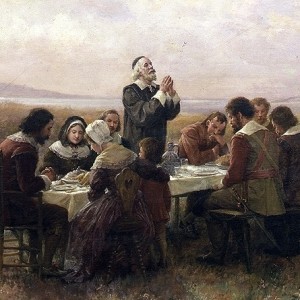
“First of all, then,” St. Paul wrote in 1Timothy 2:1-4, “I urge that supplications, prayers, intercessions, and thanksgivings be made for all men, for kings and all who are in high positions, that we may lead a quiet and peaceable life, godly and respectful in every way.”
We might have expected St. Paul to tell Timothy to pray “for kings and all who are in high position, that we may lead a quiet and peaceable life, godly and respectful in every way.” But he goes beyond that, urging that thanksgivings “for kings and all who are in high position.” That seems a bit peculiar or at least unexpected given that in AD 64, when St. Paul wrote this epistle, the Roman emperor was Nero who, among other violent and perverse behavior, ruthlessly persecuted Christians. Give thanks for him?
Here at the college there have been discussions with political philosopher, Dr. Pavlos Papadopoulos about thanksgiving as a civic virtue—something incumbent on us not only as Christians, but as citizens. With our annual national celebration of Thanksgiving coming up, we continued the conversation as a podcast.
More Episodes
 2024-05-01
2024-05-01
 417
417
 2024-04-16
2024-04-16
 293
293
 2024-04-09
2024-04-09
 305
305
 2024-04-02
2024-04-02
 246
246
 2024-03-26
2024-03-26
 266
266
 2024-03-19
2024-03-19
 274
274
 2024-03-12
2024-03-12
 315
315
 2024-03-05
2024-03-05
 279
279
 2024-02-20
2024-02-20
 278
278
 2024-01-23
2024-01-23
 300
300
 2024-01-16
2024-01-16
 438
438
 2024-01-09
2024-01-09
 290
290
 2024-01-02
2024-01-02
 341
341
 2023-12-26
2023-12-26
 290
290
 2023-12-11
2023-12-11
 369
369
 2023-12-05
2023-12-05
 358
358
 2023-11-28
2023-11-28
 298
298
Create your
podcast in
minutes
- Full-featured podcast site
- Unlimited storage and bandwidth
- Comprehensive podcast stats
- Distribute to Apple Podcasts, Spotify, and more
- Make money with your podcast
It is Free
- Privacy Policy
- Cookie Policy
- Terms of Use
- Consent Preferences
- Copyright © 2015-2024 Podbean.com






